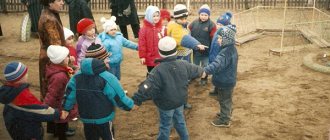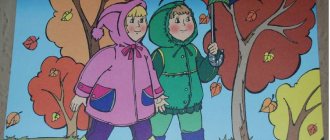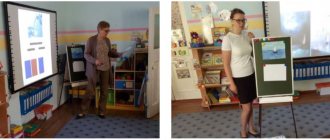Summary of a speech therapy lesson in the preparatory group “Autumn Walk”
It's drizzling cold... (rain)
It became gloomy outside the window,
The rain is asking to come to our house.
The house is dry, but outside
Appeared everywhere... (puddles)
5. Exercise “Agree on the proverb.”
The speech therapist reads the beginning of the proverb, and the children read its end.
Autumn has come and brought the harvest.
In autumn the sparrow is also rich.
And the cat has a pie in the fall.
In spring the rain steams, and in autumn it wets.
Spring is red with flowers, and autumn is red with fruits.
The autumn forest is thinner, and the bird's voice is quieter.
One berry in September, and that one is a bitter rowan.
In September, the tit asks autumn to visit.
September takes off the caftan from his shoulders and puts on a sheepskin coat.
6. Game “Count the syllables in words.”
Sheaf, autumn, leaf fall, umbrella, mushroom, cloud..... 7. Game “Yes - no”.
Speech therapist.
We will play the game “Count the leaves”.
1 child.
I have two maple leaves.
2nd child.
I don't have two maple leaves, but I do have five oak leaves.
3 child.
I don't have five oak leaves, but I do have one linden leaf.
8. Game “Help Masha harvest the harvest.” Presentation on the topic of vegetables and fruits
Speech therapist.
In autumn, vegetables are harvested in the gardens. Shall we help Masha collect the harvest? I suggest you remember and make riddles about vegetables, divide the answers into vegetables and fruits and put them in baskets.
9. Physical exercise.
Fizminutka autumn has come
There was a basket on the shelf, idle (sit down, round your arms - imitate a basket)
She was probably bored all summer (head tilts, left and right)
Now autumn has come and the foliage has turned yellow, (stand up and draw tree branches)
The time has come to harvest. (stretch, pretend to pick fruit from trees)
The basket is happy (round your arms in front of you, nod your head)
She was surprised (spread her hands)
That there are so many fruits in the garden! (rise on your toes, show a large circle with your hands)
10. Exercise “Collect apples.”
The speech therapist places flat images of a basket with apples and a pear on a magnetic board. Speech therapist.
In autumn, fruits are harvested in the gardens.
The piglets were sleeping quietly in the yard at dawn. In the morning they went to the garden and found apples in the grass. (Russian folk nursery rhyme) Speech therapist.
There are puzzles on the apples.
Let's solve them. What word is hidden? Children solve puzzles: umbrella, cloud
11. Game “Pick up a diagram.”
Speech therapist.
Choose a sound pattern for the word “vegetable”.
(exercise on phonemic analysis of words)
12. Game "Cooking".
On the board are images of the ingredients of the dishes.
Speech therapist
.
What can you make from fruits? Children.
Jam, juice, jam, marmalade, mousse, jelly, compote.
Children list dishes and show pictures.
1 child.
I made apple compote.
2nd child.
I made quince jam.
3 child.
I made some pear juice.
Speech therapist.
Well done.
You have prepared very tasty dishes. 13. End of class. Speech therapist.
Guys, today we repeated everything about autumn: the names of vegetables and fruits, months, dishes, guessed riddles. Thank you.
Publication address:
Summary of a walk in the preparatory group in the first half of the day.
Summary of a walk in the middle group in the first half of the day.
Date of:
24.04.2015
1.Weather observation.
Watching the wind. Invite the children to look at the pinwheel made together with the teacher. What can you say by looking at her? (wind blows) What can you call the weather on such a day? (windy) How do you determine which direction the wind is blowing? (turning the pinwheel) And if you don’t have a pinwheel at hand, how can you determine whether the weather is windy? (by tree branches, by clouds in the sky). What can you say about the strength of the wind? (if the turntable spins strongly, the wind is strong; if it spins slowly, the wind is weak). Put your face to the wind and tell what it is like (warm, cold, gentle, sharp, piercing).
Artistic word:
No arms, no legs, but he opens the gate.
Wind, wind, you are mighty
You are chasing flocks of clouds
You're disturbing the blue sea
You soar proudly in the open space (A.S. Pushkin).
2.Labor activity
. Cleaning up the veranda, collecting branches and old leaves from the street. Goal: to promote the desire to work together, to experience the joy of communicating with each other.
3.Games with children:
a) outdoor games:
1. "Chickens in the garden"
Purpose of the game: To consolidate knowledge about the characteristic movements of birds, to learn to imitate their voices.
Progress of the game:
Put down the log. On one side of the log, draw a large rectangle - this is a vegetable garden. On the other side of the log there are chicken children. An adult watchman walks around the garden and looks to see if there are any chickens. Then he goes to the opposite side and sits on the bench. As soon as the guard leaves the garden, the chickens fly up onto the fence (log), and then jump from it into the garden and begin to run around, pecking at the planted vegetables. The watchman, noticing the chickens, drives them out of the garden, clapping his hands and saying: “Shoo, shoo!”
2."Day Night".
Goals: teach children to run fast without bumping into each other; Be careful.
Progress of the game:
At this time, all the players are running, jumping and having fun. The main condition is that you cannot stay in place. Then the driver says the word “Night”
.
At this time, everyone should immediately “fall asleep” (freeze in the positions they were in at that moment). The driver at this moment turns around, if he notices a player who is not “asleep”, then he speaks loudly about it (including saying what kind of movement he noticed), and the player leaves the game (or becomes the driver, depending on the number of players ).The most “interesting” thing was to continue to move behind the driver’s back (so that he wouldn’t notice)
b) games of low mobility:
1."Find the mistake."
Goal: develop auditory attention; learn to clearly pronounce polysyllabic words loudly.
Summary of an open walk in the preparatory group
Summary of an open walk in the preparatory group
Conducted by: teacher of the Merey Center for Prolingual Development
No.
20 of the city of Ekibastuz Tkacheva L.D. Venue
: site
Number of children
: 25
Take-out materials:
turntables, hoops, mittens, gloves, sleds, shovels, brooms, magic box with a riddle and a task, bird food
Multilingualism:
kys -winter - winter, zheltoksan - December - December, kantar — January January, aқpan- February –February, snow -snow - kar, sled - sledges - shana, blizzard boran - snow-storm, warm mitten - zhyly kolgaptar - warm mitten, baqytty Zhana zhyl - Happy New Year - happy New Year, strong wind - strong wind - kushti zhel
Preliminary work: a colored labyrinth of frozen water in balloons
December
Conversation
- What is the first month of winter?
- What has changed at the kindergarten site compared to November?
- What has changed in people's clothing compared to autumn?
- What are the protective properties of snow?
- Look for signs of winter in our area.
- What is children's favorite holiday in December? (Bakytty Zhana zhyl - Happy New Year - happy New Year)
Observation of
by the wind.
Goal:
expanding children's knowledge about natural phenomena, developing curiosity.
Riddle:
Breaks branches, lifts snow.
You hear it, but you don’t see it. (wind) Offer turntables to determine the direction and strength of the wind. Explain to children that strong winds during snowfall cause blizzards. But snowstorms can occur without snowfall. Even in clear weather, a strong wind lifts snow from the ground, carries and swirls it with force, forming drifts and sweeping snowdrifts. This phenomenon is called drifting snow. In winter there are very often snowstorms. Experimental activity “How to warm your hands?” Goal
: identifying the conditions under which objects can warm up (friction, movement; heat conservation).
The teacher suggests putting different mittens on your hands - thick and thin - and finding out how your hands feel (one hand is warm, the other is cool). Next he suggests clapping your hands, rubbing your hands together and finding out what you felt (your hands became hot in both mittens). The teacher suggests rubbing the frozen cheek or nose with the back of the mitten and finding out what you felt (the cheek is first warm, then hot). Children conclude that objects can warm up through friction and movement. Game activity: Relay games: Purpose:
development of a sense of camaraderie, the ability to obey general rules.
-"Who is faster?"
(running, leaning on a sled)
- “Running through a labyrinth” (
dexterity, ability to change the direction of movement)
colored labyrinth of frozen water in balloons Individual work.
Children with high motor activity: “Hit the hoop.” Goal: to exercise the ability to act on a signal;
strengthen the ability to throw objects at a target. Children with low motor activity: “Sliding along icy paths.” Goal: exercise in balance. Independent activity. Goal
: implementation of acquired motor skills in independent activities.
Sledding, playing snowballs Work : 1.
“Let's clear the snow buildings”
Goal:
fostering a desire for collective participation in activities - preparing the playground.
The teacher draws the children's attention to the layer of fallen snow. He invites everyone to remove snow from paths and buildings together so that they can play. Children independently prepare tools (shovels, brooms), decide where to shovel the snow, what can be made from a new snow pile. In a snowdrift they find a magic box - candy in it task 2. Replenishing the feeder with seeds and crumbs Task from a magic box
After a walk children make a collage “The Christmas tree is dressing up, the holiday is approaching”!


